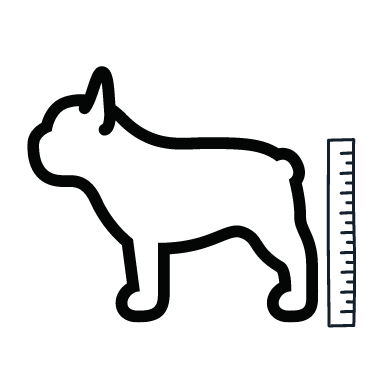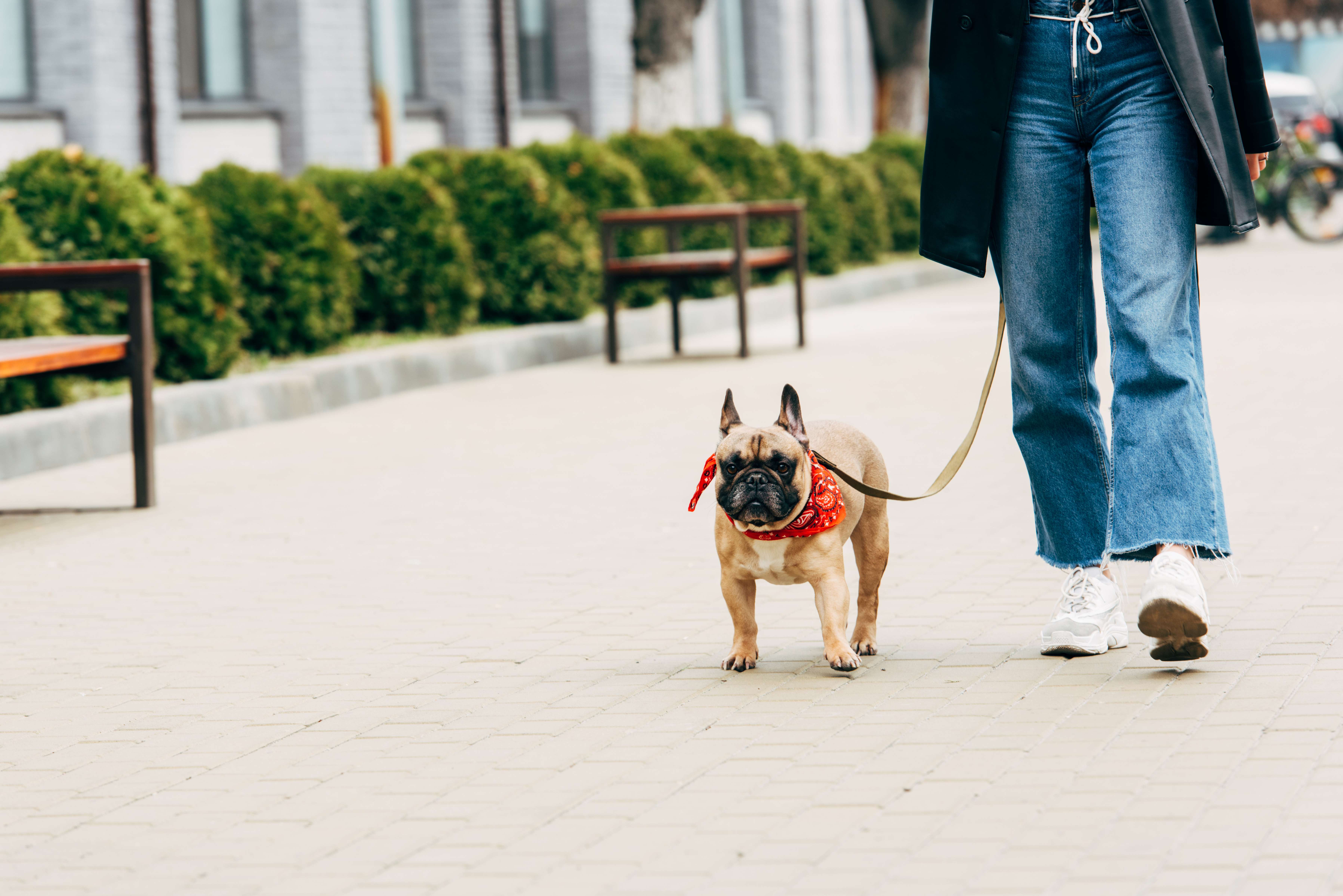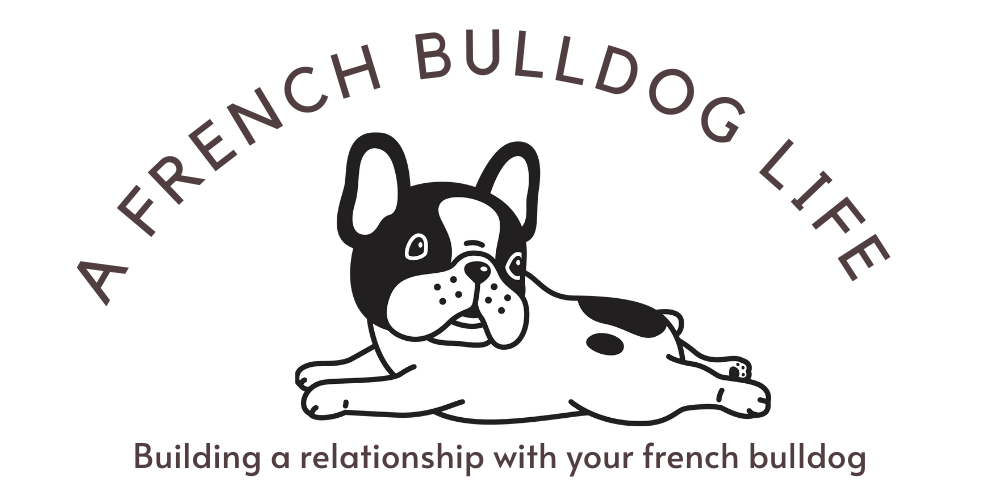French Bulldog Health
A comprehensive guide
Key Facts
Average Life Size & Expectancy

Height 11-13 inches

Weight Under 28 pounds

Life Expectancy 10-12 years

The French bulldog & their health
French bulldogs are the world’s most popular small-dog breeds, especially for those living in cities. The frenchie is alert, playful, adaptable and hilarious with their clown like nature! They have a a sturdy, muscular body with a short, smooth coat that comes in a variety of colors. They are most known for their ‘bat-like’ ears, short snout, loose wrinkled skin and a distinct pushed in nose, which is a characteristic of brachycephalic breeds.
Are French Bulldogs prone to health problems?
Yes. Like most breeds there are common health issues within a breed and the French bulldog can unfortunately be linked to several health problems that we will go through below.
Contents
Common Health Concerns
1. Brachycephalic Syndrome- French bulldogs have a flat, pushed-in face which can lead to respiratory issues. Brachycephalic syndrome encompasses various breathing problems, including narrowed nostrils, elongated soft palates and narrow tracheas. These issues can lead to snoring, noisy breathing and increased vulnerability to heatstroke
2. Heat Sensitivity – due to the brachycephalic features, French bulldogs are highly sensitive to hot weather. They can easily overheat, which can be life threatening. Owners should take precautions to keep their frenchie cool during hot periods.
3. Obesity – French bulldogs are prone to obesity (yes, one does have to resist giving extra treats to the cutest puppy face in town!). Obesity can contribute to respiratory problems and lead to other health problems. Whilst Frenchies don’t require a large amount of exercise they do require consistent small amounts and a healthy lean diet to keep them in shape.
4. Skin Issues – One thing we love about our Frenchie is the wrinkled skin. However, this can be prone to skin fold dermatitis and other skin conditions. Regular cleaning of their skin folds to prevent infection.

5 Allergies – there are a variety of allergies frenchies suffer from, including food and environmental allergens. Often, allergic reactions will manifest as skin problems and digestive issues.
6. Joint problems – joint issues such as hip dysplasia and intervertebral disc disease are somewhat common in french bulldogs. By helping them to maintain a healthy weight, eating healthily and joint supplements can help to manage these problems.
7. Eye conditions – Cherry eye (which is the prolapse of the third eyelid gland) is very common with frenchies (and expensive to be fixed). Cataracts are also common, which is why it is important to have your french bulldog checked out regularly by a vet for early detection and treatment.
8. Ear infections – frenchie’s bat like ears can trap moisture and therefore become a breeding ground for bacteria. Regular ear inspection cleaning can help prevent ear infections. We recommend asking your vet to do this to prevent any damage.
9. Gastrointestinal Problems – French bulldogs tend to have sensitive stomachs, which can make them prone to digestive issues such as flatulence and diarrhea. Supplements and a high quality, easily digestible diet will help to keep any digestive system problems to a minimum.
10. Cardiac Issues – Heart conditions can be developed by some french bulldogs, including congenital heart defects. Your vet will be able to monitor their heart health through regular check ups.
11. Reproductive Challenges – Due to their compact size and unique body shape, French bulldogs often require caesarean sections to deliver puppies as natural delivery can be risky for the mother and her puppies.
12. Orthopedic Issues – Frenchies are susceptible to various orthopedic problems, including dislocated kneecaps (luxated patellas).
Join the Frenchie gang for the latest updates
Exercising your Frenchie
Understanding your French bulldog's exercise needs
A healthy frenchie is a happy frenchie! Much like us, our frenchies need movement on a daily basis. However, due to their breed they have specific needs and limitations. As a companion dog frenchies are happy to spend most of their time with you but these little bundles of energy do need to burn some of their energy. This is also important to maintain a healthy weight and overall well being.
Exercising an adult frenchie – Short but regular bursts throughout the day are ideal for an adult frenchie for an hour total. It’s good to find a balance between short walks, playtime and mental stimulation.
Mental stimulation – French bulldogs are intelligent enough so they will also require some mental stimulation. There are
Exercising Puppy Frenchies – to protect their growing joints a small walk of 20 minutes is more than enough to tire them out. It provides stimulation and interest to a brand new puppy.


Choosing the right activities
Given frenchies sensitivity to heat and respiratory limitations low impact activities such as gentle walks and interactive indoor games are great for them. They are easier on their joints and respiratory system.
During exercise it’s important not to push your french bulldog too hard during extreme weather. As mentioned earlier, they do not have the ability to regulate their temperature as easily as other dogs so if the weather is warm- hot, it’s best to walk them in the cooler part of the day. For example, the morning or later evening once the temperature has dropped.
Some signs that your Frenchie has overexerted themselves include: excessive panting, drooling, slowing down whilst out walking. It’s important to stop and not continue to exert your dog which could make them worse.
See our article on ‘Signs your Frenchie is too hot’
Other exercise options
Even when the weather is hot there are plenty of options to keep your frenchie happy and active. Here are some tips:
1. Keep them busy with a treat filled toy or other interactive puzzle toys that will keep their minds engaged.
2. Teach them a new trick and reinforce other ones. Games such as hide n’ seek are a great way to get them thinking about where food might be hidden.
3. Change up the way you feed them – a snuffle mat, for example, is a great way to mix up their feeding. It taps into the way they used to forage for food and they have to use their senses to find it.
4. Use their indoor toys to play fetch but make them sit and wait until you command they can fetch the toy to add extra thinking and training.
5. Socialisation – taking them to a dog friendly cafe is a great way to be out and about and interacting with people and dogs.


Monitoring Health
Each french bulldog is different and their exercise needs will vary amongst them. Some may require more activity than others, so it’s essential to tailor routines to their specific needs.
Regular vetinary check ups are essential in monitoring the overall health of your Frenchie, especially their joints and respiratory system. By detecting health issues early on it will make it easier to manage any issues and prevent any harm to your beloved Frenchie!
As Frenchies get older they require extra care and attention. You can read more on Caring for an ageing Frenchie here.
Keeping your frenchie looking good
Keeping your fur baby in good health also includes their grooming and in particular with their skin folds. So let’s take a look at how you can keep on top of your frenchie’s looks:
1.. Coat Care – the french bulldog has a short, smooth and often fine coat. Their coat will always benefit from a good brush (you can see our readers best brush picks here). Regular brushing distributes natural oils keeping the coat healthy and of course, reduce shedding (we all know about the fur!!).
2. Bathing frequency – while it’s good to bath your frenchie they don’t need to be washed every week (unless they have got exceptionally dirty or have developed a skin issue). The skin naturally needs to be allowed to distribute the oils over a few weeks. Washing too often will prevent this from occurring as shampoo can strip the body of these important oils.







